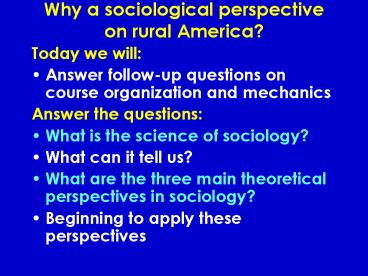Why a sociological perspective on rural America - PowerPoint PPT Presentation
1 / 22
Title:
Why a sociological perspective on rural America
Description:
Systematic observation, science and research in sociology ... It can be applied to help us understand others perhaps most importantly, those ... – PowerPoint PPT presentation
Number of Views:52
Avg rating:3.0/5.0
Title: Why a sociological perspective on rural America
1
Why a sociological perspective on rural America?
- Today we will
- Answer follow-up questions on course organization
and mechanics - Answer the questions
- What is the science of sociology?
- What can it tell us?
- What are the three main theoretical perspectives
in sociology? - Beginning to apply these perspectives
2
What is the science of Sociology?
- Concerned with what people do as members of a
group or interacting with one another (Schaefer) - Stresses the social context in which people live
and how these contexts influence peoples lives
(Henslin) - How people are influenced by (and influence)
their society (Henslin)
3
What is the science of sociology?
4
What is science?
- A body of knowledge based on systematic
observation - In sociology this systematic observation is
focused on human behavior in relation to human
groups (organizations, networks, communities,
countries).
5
Systematic observation, science and research in
sociology
- To ensure that systematic observation was used to
assess or test sociological conceptssociology
adopted the scientific method of research - Attempts to be like natural sciences in this
regard - Difficult when humans are the subjects of study
- More on this in two weeks when we talk about
research methods
6
The sociological imagination
- Attributed to C. Wright Mills (1959)
- The sociological perspective enables us to grasp
the connection between history and biography. - Historythe development of a society
- Biography- an individuals specific experience in
society - An awareness of the relationship between an
individual and the wider society
7
Sociological imagination (cont.)
- How has U.S. society developed?
- What about its history makes it what it is and
shapes attitudes and beliefs today? - Differences from other societies?
8
Sociological imagination (cont.)
- What is your biography? Where do you fit in your
larger society? How does that shape your
beliefs, actions and opportunities?
9
Sociological imagination Placing George W. Bush
in social context
- The sociological imagination allows us to begin
to understand what has shaped President Bush to
be where he is and to believe what he does.
10
Sociological imagination (cont.)
- It can be applied to help us understand
othersperhaps most importantly, those who dont
come from the same place we do - Use as a manager
- Use in understanding conflict
- Use to help bridge differences among individuals
or groups/organizations - Use to identify shared goals
11
The Science of Sociology Scientific findings vs.
common sense
- Belief that sociology is just common sense.
- We all live in society, so we know all about it.
- So, no need to study human behavior or how we are
influenced by and influence society - If only it were that simple!
12
Sociological perspectives can help explain
differences between groups, unusual or unexpected
behavior or outcomes
- Why do people work together to overcome
disasters? - Why is poverty higher in rural than urban areas?
- Why are African American adolescents less likely
to smoke than whites?
13
Quick Quiz on sociological findings vs. common
sense (from Henslin, 1998)
- Most people on welfare are lazy and looking for a
handout. They could work if they wanted to. T/F
14
Sociological findings vs. common sense
- 2. African Americans in the South are more likely
to live in segregated housing than are African
Americans in the North. T/F
15
Sociological findings vs. common sense
- 3. The earnings of U.S. women have just about
caught up with those of U.S. men. T/F
16
What is sociological theory?
- Theorya formulation of apparent relationships,
underlying principles, or explanations for
certain observed phenomena. - Sociological theory explains
- How being part of a group affects human behavior
or experiences - Causes and consequences of membership in a group
- More broadly, why society is organized and
functions as it does - How our relationships with others affect us and
them
17
Major theoretical perspectives in sociology
- Functionalistassociated with Talcott Parsons and
Robert Merton, influenced by Durkheim - Conflictassociated with Karl Marx,W.E.B. DuBois,
C. Wright Mills - Symbolic interactionistassociated with George
Herbert Mead, Charles Horton Cooley and Erving
Goffman - Feministan extension of conflict theory
18
Sociological Perspectives
- During the video, make notes on
- What are the basic assumptions of each of the
four perspectives - What are the questions addressed by each
- Small group activity to outline these for each
perspective
19
Examining Family A key social system
- Functionalist perspective
- Conflict perspective
- Interactional perspective
- Feminist perspective
20
Using the family example, would you expect
families to be different for people living in
rural and urban areas or on farms? If YES,
why?If NO, why not?
- Questions such as these form the basis for rural
sociological research.
21
How to use social theory to think about a real
social question.
- Each perspective contributes to understanding
- But, the predominant approach is often determined
by what we want to know about the question or
issue being examined - Different perspectives are most useful and can be
tested empirically when they predict different
behaviors or outcomes
22
Next class
- Topic
- Who Lives in rural America and how is the
population of rural America changing? - Readings
- Fuguitt (population composition)
- Amber Waves (rural Hispanics)
- Center for Rural Pennsylvania (rural women)































